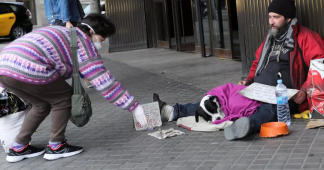By Dr Lisa McKenzie
25 Apr, 2020 17:12
The Covid-19 crisis is shedding new light on class relationships in a number of ways, not least in how the UK government has defined its financial package of support. While fair for some, for others, it’s tantamount to a 20 percent pay cut on the minimum wage, or, in the worst cases, leaves them to fall straight through the safety net.
I’m thankful that I fall into the category on full pay, safely working from home, but most of my family are furloughed from the retail and service industry, and are trying to survive on a pay reduced one-fifth from what they were struggling to make ends meet with a month ago. And while for some of my kin, rent, council tax, and utility bills are on hold during the pandemic, thanks to government recommendations that landlords and utility companies take an empathetic approach to money owed, these debts haven’t disappeared and are simply building up to be paid later.
Too small for the safety net
Then there are those others among my family and friends who are ‘self-employed’ – not self-employed like Richard Branson or David Beckham, but ‘gig’ workers, people who have very few employment rights and no job security at all. Many of them are now facing the daily anguish of deciding whether to continue their work as a driver for an app, delivering food, medicine, and, for some, their new spring wardrobe – because, yes, some customers think a new summer dress is essential enough for people in a warehouse to have to work to pack and a delivery driver being paid a couple of quid to deliver in the middle of a pandemic.
And then there’s the other group of self-employed workers, who came up in conversation with my friend Lisa Stepanovic, who runs Social Ark in East London, a social enterprise that mentors working-class young people, usually from very tough backgrounds, in setting up their own community-based business. Most of Lisa’s mentees are also part of the group that’s fallen through the gaps in the government financial package. They are young, have no family wealth to support them, and are establishing small start-ups that are still in their early stages. One example Lisa cites is Time to Shine, a small cleaning business set up by single mothers, who, in the coronavirus crisis, have been left with no support options but Universal Credit, a program with plenty of flaws, and the hope that they’ll someday be able to work for themselves again.
These insecure workers are what we sociologists call ‘the precariat.’ It is they, more than the rest of the British working class, who nowadays fall through the cracks. They are neither employed or even self-employed, really; they are merely eking out an existence or being exploited by an app on their phone.
The lowest class
The precariat is the lowest of the seven classes we identified when, with Professor Mike Savage, at the London School of Economics, we embarked on what we called ‘The Great British Class Survey’. I worked with him from 2013 to 2016, and was tasked with researching those at the bottom of the food chain – those even lower than the so-called traditional working class in terms of income, education, and social relationships. Members of the precariat are people whose lives are defined by the opposite of safety – in other words, precarity.
For most left-leaning people, their class analysis has its roots in a Marxist critique of class – or what they think is a Marxist critique of class – where there are three classes, or sometimes two: those who own the means of production and those that have no other recourse but to sell their labor. This is a much-recited political narrative that can be heard on plenty of trade union and leftist marches, especially the annual march against austerity organized by the larger unions, the Labour Party and affiliated groups.
Grimly amusing as it is that there could be a mass march through the UK capital titled ‘End Austerity’ that takes place year on year, the most depressing element of such an event is the feeble, end-of-demo speeches. Time and again, I’ve heard some trade union leader or semi-celebrity misquoting Karl Marx on the means of production. I once heard a really posh-sounding comedian on stage in Trafalgar Square telling the 20,000 marchers that there should be a round of applause for the police officers as they were “workers in blue”, selling their labor just like the rest of us (including him, a jobbing well-heeled comedian with a BBC show, presumably).
At this same ‘End Austerity’ march, in 2017, I was outside Topshop on Oxford Street, picketing with the United Voices of the World. It’s a small, self-organized grassroots union seldom officially recognized by large employers, but it represents those with the least power – namely, migrant workers whose second or even third language is English, who are largely black, Asian and Latino, and overwhelmingly working in subcontracted zero-hours cleaning jobs, or in the ‘gig economy.’ We were picketing the Topshop store because it had sacked one of its cleaners, likely due to trade-union organizing activities. As we did so, 20,000 trade unionists, Labour supporters and left-wing activists just marched on by, probably unable to see us behind the wall of police officers kettling us into a wall. Which goes to show that there’s the working class – and then there’s the precariat.
It could be you, next
The reality is that the British self-employed are too often at the mercy of the app on their phone or, like the young people seeking support from Social Ark, are simply trying to stand on their own and not be a burden to society, as they’re regularly accused of being. These self-starters are doing everything the working classes have been asked to do, including buy into capitalism’s lie that we can all reach the dizzying heights of Lord Alan Sugar or Victoria Beckham if we work hard enough and have some ‘special talent.’ But with every day that passes during this pandemic, as workers such as these are continually abandoned by everyone, these capitalist myths are being exposed for the bunkum they are.
The subject of class and class inequality in the UK can seem complicated and abstract, if you think too much about the definitions of the precariat, the traditional working class, the lumpenproletariat. However, the reality is that there has never been a ‘traditional’ working class, but rather a large sector of society whose lives are always one meal, one day, or one week away from absolute poverty. If there’s one thing we can be sure about it’s that such divisions are good only for those who wish to exploit the working class. It’s crucial to understand that whether you’re a furloughed shop worker or a rent-a-chair hairdresser, you’re now in a position as precarious as the subcontracted cleaner working on a zero-hours contract and the driver relying on an app for their next job.
The British government and the wider left need to have more respect for the low-paid, insecure, unorganized precariat. These powerless workers do not and likely will never own the means of production. As we move forward into an unknown future, it will be not only the precariat and the unionized working class that finds itself struggling to find enough work, but each and every one of us, with a single exception: the super-rich, who are somehow immune even to the worst economic impacts of a pandemic.
*Dr Lisa McKenzie is a working-class academic. She grew up in a coal-mining town in Nottinghamshire and became politicized through the 1984 miners’ strike with her family. At 31, she went to the University of Nottingham and did an undergraduate degree in sociology. Dr McKenzie lectures in sociology at the University of Durham and is the author of ‘Getting By: Estates, Class and Culture in Austerity Britain.’ She’s a political activist, writer and thinker. Follow her on Twitter @redrumlisa.











